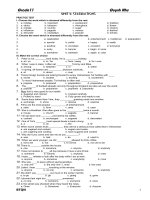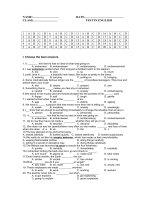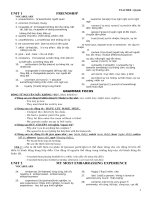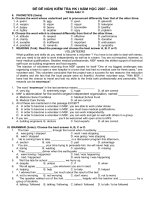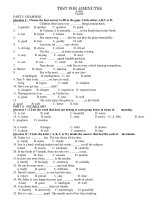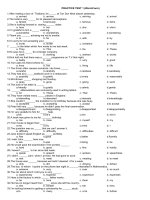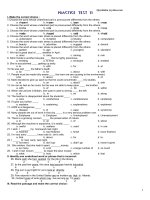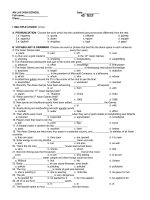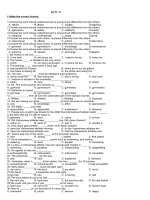test 11
Bạn đang xem bản rút gọn của tài liệu. Xem và tải ngay bản đầy đủ của tài liệu tại đây (288.12 KB, 10 trang )
TEACHER : Quỳnh
UNIT 1 FRIENDSHIP
VOCABULARY
1. acquaintance :
2. common chung
3. incapable of
!", "#$%##
&!"&'
4. quality " !"
5. unselfishness ($)' ' "*
6. be concerned with +% "# &
7.$$,$-&!"*$$,+*-&!"
.,&/"
8.give – and - take:"#và nh n0
9. constancy !&#' &,'
! & !*
10. enthusiasm 12+343! !
&!'
11. changeable )%5%&6**
*, ",#:"#%&6
*
12. uncertain (+.7#8#$
#/" "" "#-!"
13. loyalty #,
14. "#)!9!!
15. ,#,,+,#,,+9
9&
16. #"*&!& "
"*&!#
17. ,,(!' &!#!
"!*
#-.,#/,##: "!*'
&!
18. 2+2* -
96$$"#8"#+
!*&& 86
19. secret +, ' !
20. ** 1.**$#,8
#,%##%*/!"9!
"9!"
21. !"' "!"&* !
22. 2#*%5!-!#!-
&-
23. pursuit 2+.,#$#/
#
GRAMMAR FOCUS
ĐỘNG TỪ NGUYÊN MẪU KHÔNG “TO”. (Bare Infinitive)
1/ Dùng sau các động từ khiếm khuyết (Modal verbs) như : can, could, may, might, must, ought to…
- You may go now.
- They must finish the work by now.
2/ Dùng sau các động từ : HAVE, LET, MAKE, HELP…
- I helped the child tidy his desk.
- He had a painter paint the gate.
- They let him enter the room without a ticket.
- My parents make me go to bed early.
3/ Dùng sau BUT, EXCEPT với nghóa “ngoại trừ”
- Why don’t you do anything but complain ?
- She agreed to do everything but help him with the homework.
4/ Dùng sau các động từ chỉ giác quan như : see (nhìn thấy) , watch (xem thấy) , hear (nghe thấy) , notice
(để ý) , observe (quan sát) , spot (thoáng thấy) …
- We heard them sing all morning.
- He saw the thief enter the house.
Chú ý : như ta đã biết hiện tại phân từ (present participle) có thể được dùng cho các động từ trên để
diễn tả hành động đang tiếp diễn. Còn động từ nguyên thể dùng trong trường hợp này chỉ hành động đã
hoàn tất.
- I watched them playing football for a while. (trận đấu vẫn đang tiếp diễn)
- I watched them play football yesterday afternoon. (xem toàn bộ trận đấu)
UNIT 2 MY MOST EMBARRASSING EXPERIENCE
VOCABULARY
24. embarrass 4, , 9
! embarrassed , embarrassing,
embarrassment
25. experience ,&!, #
":,":& &!, #,*
:,": #!"#&!
1
TEACHER : Quỳnh
26. floppy $&!
27. idol: % a person / thing is loved or
admired very much:!
28. extreme: ,+ very great
extremely:-"!!"""!""!"!
29. glance at : to look quickly at sth/sb
30. sneaky sneakily + -!,!
*-#,: -
31. imagine: 4%5 !'
%
32. affect $ , "!
33. ,",+)
"#
34. %42+% !&
35. "#$%"$%!"!*!
36. embrace ,"
37. make a fuss : làm m ; <
38. #,,
&!"
39. outlook .#####/
" "'9&
40. protect ,.#,#"##%*8
#8$,##/#-&!
#!""
41. scream ,+ # &
42. escape."$,##/
, #
GRAMMAR FOCUS
I. SIMPLE PAST - PAST CONTINUOUS
+ Thì Simple Past (Quá Khứ Đơn) được dùng để chỉ một hành động ngắn (thình lình) xảy ra trong quá khứ.
- I met him in the street yesterday. (Hôm qua tôi gặp hắn ta ở trên đường)
+ Thì Past Continuous (Quá Khứ Tiếp Diễn) được dùng để chỉ một hành động kéo dài trong quá khứ tương ứng với một
hành động khác cũng trong quá khứ.
- I met him while he was crossing the street.
(Tôi đã gặp hắn ta khi hắn ta đang băng qua đường)
- She was going home when she saw an accident.
(Cô ấy đang về nhà øthì cô ấy nhìn thấy một tai nạn)
+ Thì Past Continuous còn diễn tả một hành động kéo dài tại điểm thời gian xác đònh ở quá khứ hoặc
hai hành động liên tiếp song song với nhau.
- My father was watching TV at 8 o’clock last night.
(Vào lúc 8 giờ tối qua ba tôi đang xem TV.)
- I was doing my homework while my father was watching TV.
(Tôi đang làm bài tập trong khi ba tôi đang xem TV.)
Put the verbs in brackets in the past simple or the past continuous tense.
1/ He (sit) __________ in a bar when I (see) __________ him.
2/ When I (go) __________ out, the sun (shine) __________.
3/ The light (go) __________ out while I (have) __________ tea.
4/ When it (rain) __________ , she(carry) __________ an umbrella.
5/ We (walk) __________ to the station when it (begin) __________ to rain.
6/ He (teach) __________ English for 2 months when he (live)_________ in Germany and (work) __________ as a
journalist.
7/ The house (burn) ________ fast, so we (break) ________ the window to get out.
8/ He (eat) __________ three sandwiches while you (talk) __________ to him.
9/ The servant (drop) __________ two cups while she (wash up) __________ last night; neither of them (break)
__________.
10/ While he (write) __________ a letter, the telephone (ring) __________; as he (go) __________ to answer it, he
(hear) __________ a knock on the door; the telephone (still, ring) __________ while he (walk) __________ to the door,
but just as he (open) __________ it, it (stop) __________.
II. SIMPLE PAST - PAST PERFECT
+ Thì Past Perfect (Quá Khứ Hoàn Thành) dùng để chỉ một hành động xảy ra trước một hành động khác cũng trong quá
khứ (past action).
- When he had finished his work, he went home.
(Khi đã làm xong việc, nó trở về nhà)
-By the time I arrived at the station, the train had gone.
(Vào lúc tôi đến nhà ga thì xe lửa đã chạy rồi)
2
TEACHER : Quỳnh
+ Thì Past Perfect còn diễn tả một hành động xảy ra trước một điểm thời gian xác đònh ở quá khứ.
- By 10 o’clock last night, I had gone to bed.
(Tôi đã lên giường ngủ trước 10 giờ tối qua.)
Put the verbs in brackets in the past simple or the past perfect tense.
1/ They (go) __________ home after they (finish) __________ their work.
2/ He (do) _________ nothing before he (see) ___________ me.
3/ He (thank) __________ me for what I (do) __________ for him.
4/ I (be) __________ sorry that I (hurt) __________ him.
5/ After they (go) __________ , I (sit) __________ down and (rest) __________.
6/ When I (arrive)___________, the dinner (already, begin) ______________.
7/ My friend (not see) _______ me for many years when I (meet) _____ last week.
8/ He (learn) __________ English before he (leave) __________ for England.
9/ In England, he soon (remember) __________ all he (learn) __________.
10/ They (tell) __________ him they (not meet) __________ him before.
11/ He (ask) __________ why we (come) __________ so early.
12/ She (say) __________ that she (already, see) ___________ Dr. Rice.
13/ By the time Bill (get) __________ there, the meeting (start) __________.
14/ When we (arrive) __________ at our place, we (find) __________ that a burglar (break) ____________ in.
15/ Almost everybody (leave) _______ for home by the time we (arrive) _______.
UNIT 1 FRIENDSHIP
TE ST 1
Choose the word which has the underlined part pronounced differently from the rest.
1. a. village b. dangerous c. gossip d. passenger
2. a. which b. changeable c. each d. characteristic
3. a. pasture b. acquaintance c. constant d. talkative
4. a. uncertain b. tell c. pursuit d. picture
5. a. chore b. machine c. much d. such
Choose a, b, c, or d that best completes each unfinished sentence; substitutes the underlined part; or has a
close meaning to the original one.
6. She found it difficult to get ____________ with new friends.
a. acquaint b. acquainted c. acquaintance d. acquaints
7. My friend often shows her _________ whenever I have troubles.
a. sympathy b. sympathize c. sympathetic d. sympathetically
8. He does not know much about the project but he is very _________.
a. enthusiastic b. enthusiast c. enthusiasm d. enthusiastically
9. Daisy is so _________ . She only cares about herself, not about other people.
a. helpful b. selfish c. loyal d. talkative
10. She is not determined and often changes her ideas. What a /an __________ girl she is!
a. uncertain b. mutual c. suspicious d. changeable
11. Although we are classmates, I do not have an ______________ relationship with him.
a. aimless b. unselfish c. special d. acquaintance
12. John left a ___________ impression on me. I will never forget him.
a. loyal b. lasting c. capable d. constant
13. _______ is the quality of being faithful and loyal to a particular person or belief.
a. Acquaintance b. Constancy c. Sympathy d. Sorrow
14. He is not good ___________ maths. He is incapable ______________ calculating .
a. at/ of b. on/ for c. for/ of d. with/ in
15. Two friends should be loyal ______________ each other.
a. on b. with c. over d. to
16. My close friend is often concerned _____________ all problems that I mention.
a. over b. with c. above d. into
17. ____________ friend in need is __________ friend indeed.
a. The/ the b. A/ a c. ∅/∅ d. ∅/ the
18. The exam is coming so the teachers make their students ____________ a lot.
a. study b. to study c. studying d. studied
19. Her parents want her __________ a doctor.
a. become b. to become c. becoming d. became
20. It is __________ the directions.
a. you too kind to give me b. you very kind to give me
c. very kind of you to give me d. very kind of you give me
21. I consider it my affair ____________ the newcomers in my class.
3
TEACHER : Quỳnh
a. to help b. help c. helped d. helping
22. These employees are made _________ overtime.
a. to work b. work c. working d. worked
23. The teacher never lets us _________ out when _____________.
a. to go/ explains b. go/ explaining.
c. going/ to explain d. gone/ explained.
24. Whenever I see an action film, I feel my heart _____________ strongly.
a. to thump b. thump c. thumping d. thumped
25. He bought a computer because he wanted to store all the information that he had collected.
a. Buying a computer because he wanted to store all the information that he had collected.
b. Although he wanted to store all the information that he had collected, he bought a computer.
c. He bought a computer for him that he stored all the information that he had collected.
d. He bought a computer to store all the information that he had collected.
26. He was the first __________ the fire.
a. discover b. to discover c. discovering d. discovered
27. The manager had some letters to sign.
a. that he had to sign b. for signing
c. so that he signed d. which are for signing
28. I think he is _______________ our business.
a. not reliable enough to be informed b. not enough reliable to be informed
c. no reliable enough for being informed d. not reliable enough being informed
29. He is ___________ everybody in my class likes him.
a. very kind that b. kind enough that c. so kind that d. as kind as
30. John was _________ we all want to make friends with him.
a. so a good student that b. so a student that
c. such a good student that d. a student such good that
Choose the best sentence that can be made from the cues given.
31. Peter/ my close friends.
a. Peter is my close friends b. Peter is one of my close friends.
c. Peter is one my close friends d. Peter is the one of my close friends.
32. he/ good – looking / blond hair
a. He is good looking, but blond hair. – b. He is good looking and blond hair. –
c. He is a good looking with blond hair. d. He is good looking with blond hair. – –
33. square face/ look/ intelligent.
a. His square face looks intelligently. b. It is a square face looking intelligent.
c. He has a square face looks intelligent. d. He has a square face which looks intelligent.
34. we/ be/ friends/ last school year.
a. We have been friends since last school year. b. We were friends since last school year.
c. We are friends since last school year. d. We are friends since last school year.
35. Peter/ good/ Maths.
a. Peter is very good at Maths. b. Peter is too good at Maths.
c. Peter is very good for Maths. d. Peter is too good for Maths.
Read the passage carefully and choose the correct answer.
There are many proverbs about friends and friendship, such as True friendship is like sound health; the value“
of its seldom known until it is lost , and A real friendship is someone who walks in when the rest of the world walks” “
out . When you read these quotes, stop and think about your friend ship. Do you and your friend act in a caring way” –
towards one another, do you respect them and do they respect you, but most of all do you value the relationship and
love spending time together? Friendship is more than just hanging out together at lunch and gossiping about other
people. True friend ship is when two people have mutual respect for one another, and really care about the each–
other s feelings and dreams. You need to be able to be honest with your friends. If there is ever a time where you feel’
that you cannot tell them the truth, for fear that they will be mad or will not understand, then they are not true friends.
Friends share with each other important things that they would not share with others. Friends also care about each
other, stick up for one another and enjoy spending time together.
36. The passage is about _________________.
a. a friend b. friendship
c. proverbs about friends and friendship d. caring for friends
37. The author advised us ________________ .
a. not to tell a secret to a friend b. to respect our friends
c. not to tell a friend about important things. d. to make friends to gossip.
38. Friends _________.
a. should not spend time together b. should be honest
c. should gossip about others d. should not care much
39. Which sentence is NOT true?
4
TEACHER : Quỳnh
a. Friends should respect each other.
b. We should be honest with our friends.
c. We can share important things with a friend.
d. Dishonesty is needed for true friendship.
40. Which of these can be used to describe true friendship?
a. be honest and be mad b. hang out and gossip
c. have lunch and gossip d. trust, respect and share
Fill in each numbered blank with one suitable word or phrase.
(41) _____________ you grow and mature your friends may change, but that does not mean that
you have to (42) _____________ away with your old friends, your relationships may change though. (43)
______________ close attention to the different types of friends you have had, the (44) ____________
your friends treat you, what sort of things you can talk about, and the things you like (45)
_______________. Soon you will see what (46) ___________ in a friend are most important to you. Not
everyone values openness or honesty, when others look (47) __________ an extraordinarily caring
individual caring individual as a friend. Whatever it is that you value most, (48) ____________ sure that
your needs as well as your friends’ are being met. If you are feeling neglected or mistreated by a “friend”
then you need to look more closely at this relationship. Friend – ship should bring you joy, (49)
_________ misery. Find out what you want out of a friendship, and try not to be overtaken by those
around you who are not yet mature enough (50) __________ to a true friendship.
41. a. Because b. For c. Although d. As
42. a. make b. get c. give d. do
43. a. Look b. Give c. Pay d. Take
44. a. way b. fact c. road d. route
45. a. to do b. do c. did d. done
46. a. possibilities b. certainties c. qualities d. quantities
47. a. at b. for c. down d. into
48. a. make b. feel c. keep d. turn
49. a. nor b. not c. none d. no
50. a. commit b. to commit c. committing d. committed
________________________________
TEST 2
Choose the word which is stressed differently from the rest.
1. a. acquaintance b. easily c. capable d. quality
2. a. constancy b. attraction c. changeable d. mutual
3. a. rumour b. believe c. common d. number
4. a. loyalty b. uncertain c. sympathy d. influence
5. a. gossip b. interest c. between d. friendship
Choose a, b, c, or d that best completes each unfinished sentence; substitutes the underlined
part; or has a close meaning to the original one.
6. He was so __________ that he distrusted all his friends.
a. suspect b. suspicious c. suspicion d. suspiciously
7. Friendship offers us great __________ in life.
a. please b. pleasant c. pleasure d. pleased
8. He is always ___________ in word and deed.
a. loyal b. loyally c. loyalty d. loyalist
9. My father took ___________ an interest in collecting stamps. He had a valuable stamp collection.
a. on b. up c. in d. over
10. True friendship should be based __________ understanding each other and faithfulness.
a. out b. at c. on d. over
11. I do not want to listen to you. I am tired _____________ your criticisms.
a. of b. in c. for d. with
12. I seem to remember that Sam has ever told me __________ number of ____________ lies.
a. a /∅ b. the / the c. ∅/ the d. the/ ∅
13. True friendship will ___________ as long as our lives.
a. spend b. take c. last d. keep
14. The father is the one that I can share both joys and sorrows.
a. feelings of great happiness b. great eagerness
5
